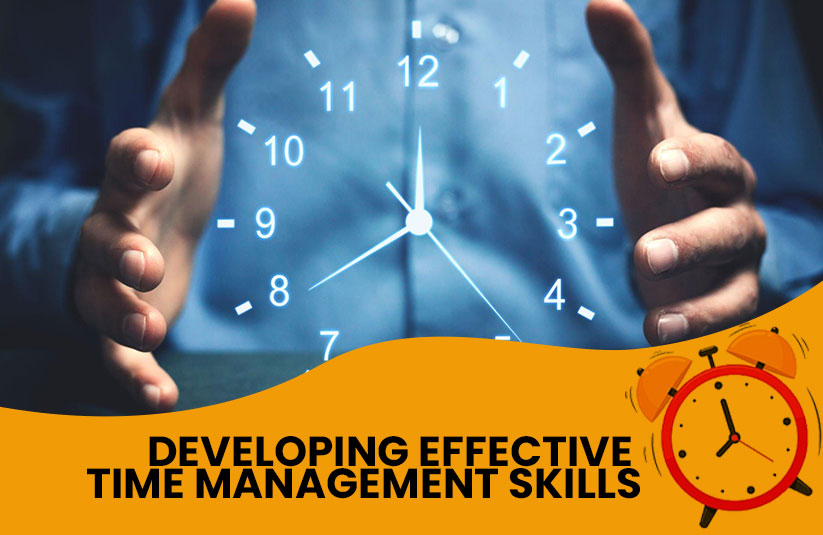Developing effective time management skills is a proven method for boosting productivity. By effectively managing their workload, companies can pave the way for success. Time management strategies are crucial for reducing anxiety and stress, minimizing distractions, and increasing productivity. It’s important to take control of your time instead of letting it control you. The famous time management quote from Paul J. Meyer says, “Productivity is never an accident. It is always the result of the commitment to excellence, intelligent planning, and focused efforts.” Here’s a helpful list of tips for improving your time management skills.
Start Your Task Before the Scheduled Time
Begin your scheduled work ahead of time instead of waiting until the last minute. This will reduce traffic and demonstrate your dedication, creating a positive impression. It will also increase your enthusiasm for your work.
Decide Your Priorities
When it comes to time management skills, it’s important to prioritize your work. It’s crucial to have a clear understanding of the tasks at hand. Creating a well-defined work schedule will help in achieving business goals. You can categorize your work based on the following criteria:
Urgency: Identify tasks that require immediate attention or have strict deadlines. These should be given high priority.
Importance: Determine the significance of each task in relation to your overall goals and objectives. Tasks with greater importance should receive priority.
Complexity: Assess the complexity of each task. More complex tasks may require more time and effort, so it’s essential to allocate sufficient resources.
Value: Consider the value each task adds to your personal or organizational goals. Focus on tasks that contribute the most significant value.
Dependencies: Take into account tasks that are dependent on others or require specific conditions to be met before they can be started or completed.
Frequency: Identify recurring tasks and establish efficient ways to handle them to minimize their impact on your time.
Consequences: Think about the potential consequences of not completing a task on time. Tasks with severe consequences should be prioritized.
By categorizing your work using these criteria, you can create a well-structured plan and allocate your time and resources effectively to maximize productivity and achieve your goals.
Say No to Multitasking
Having a multitasking personality may seem beneficial at first, but attempting to multitask can be time-consuming and reduce focus on specific tasks. Engaging in multitasking has also been known to negatively impact memory and reduce focus on individual tasks. Therefore, it is best to concentrate on one task at a time. Contrary to popular belief, this approach will not negatively affect the quality of your work.
Learn Decision-Making Skills
At times, decision-making can be a time-consuming process in our work. Therefore, it’s essential to learn how to make quick decisions to work efficiently. Prioritize tasks by determining which one needs to be tackled first and figuring out how to complete it promptly.
Establish a Task Schedule and Set Deadlines
By creating a list of tasks and their deadlines, you can stay on track and remain productive. Having a visual representation of your upcoming work will help you stay organized. Keep track of the status of each task to maintain a professional approach. This will also help you develop planning and foundational skills.
Remember to keep your workspace organized
In the workspace, make sure to put things in their proper place, file documents correctly, return items to their designated locations after use, and always keep all accessories that are required frequently. These practices will help you find them easily when needed and develop good habits.
Figure out your peak productivity hours
Some people work best in the morning, while others prefer flexible or rotating shifts. Determine which hours allow you to be the most productive and stick to a regular schedule.
Read Here: Key Strategy to Improve Workplace Engagement and Productivity
Conclusion
Following these management techniques will help you learn effective time management skills. These skills will assist in developing organizational skills, fostering business growth, and improving self-management techniques. They will also help you learn how to spend your time wisely to enhance workspace effectiveness
FAQ:
What strategies can help develop effective time management skills?
First, you have to start with a healthy morning routine, create a to-do list, begin with the highest-value tasks, reduce distractions, and avoid multitasking work.
How can goal setting contribute to better time management?
Time management offers numerous benefits to achieving organizational goals. Such as allowing employees to focus on their goals and improve organizational productivity.
What tips can help to manage distractions and stay on task?
Getting rid of distractions from the workplace leads to improving production. Here are the tips to eliminate distractions, preplan daily activities, set time limits for your goals, try to complete tasks before their deadline, draw achievable goals, keep yourself away from distractions, set a comfortable environment, get adequate sleep, and do meditation. These tips will assist in managing distractions and performing tasks effectively.













